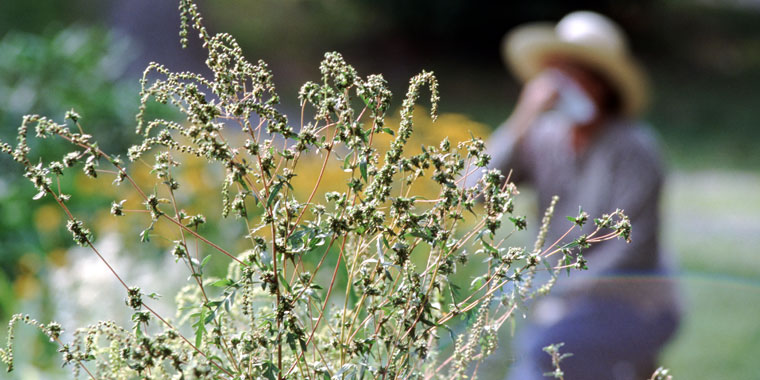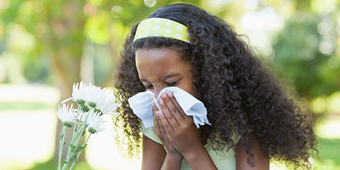Ahhh Or Achoo? Warm Weather And Allergens Return

Find Your Perfect Match
Answer a few questions and we'll provide you with a list of primary care providers that best fit your needs.
Likely, you look forward to the return of warm weather.
The return of allergy season? Not so much, if pollen, mold, and dander make you sneeze, your nose run, and your eyes water.
Kevin Baker, a certified family nurse practitioner, tells Premier Health Now that he’s been seeing a lot of these symptoms in his patients lately. That’s typical, he says, when winter’s dry air makes way for the warmer, damper air of spring – a welcome boon to mold and pollen.
Some reports point to climate change as a factor in the early reprise of allergy season. Baker advises that’s not for him to say; he’s not a climatologist.
But the Harvard T.H. Chan School of Public Health cites a study published in Proceedings of the National Academy of Sciences, which found that, from 1990 to 2018, pollen seasons lengthened by 20 days and pollen counts increased by 21 percent. The study also found that human-driven climate change contributed to about half the lengthened season and to 8 percent of higher pollen counts.
Regardless of climate change, the Miami Valley region is particularly prone to pollen-, mold-, and dander-related allergies. Dayton ranks 13th nationally, and No. 1 in Ohio, in the Asthma and Allergy Foundation of America’s Allergy Capitals™ ranking for 2022.
“We have a pretty dense population of different types of dander, molds, pollens in this area, tree pollen, grass pollen, and those levels tend to rise earlier,” Baker says.
Another contributor to the recent surge in seasonal allergies, Baker surmises, “could be that we’re more cognizant of allergy symptoms in this COVID climate. Everybody pays attention to their symptoms more closely now.”
Is It COVID Or Seasonal Allergies?
“With allergies, you’re typically not going to get a fever,” Baker explains. “You can still have some brain fog and fatigue with allergies, but the fever is the big differentiator. Chest pain, shortness of breath can come along with allergies, too, but that’s usually for somebody with COPD (chronic obstructive pulmonary disorder) or asthma.”
Runny, stuffy, or itchy nose, sneezing, watery eyes, headache and fatigue, sore throat or coughing, and postnasal drip are all indicators of seasonal allergy.
“But if the patient has been exposed (to COVID) and they have these new onset symptoms that come on abruptly, it could be COVID. Either way, it’s good to speak with your health care provider to get evaluated and see which lane you’re in.”
Diagnosis And Treatment
Diagnosis and treatment of allergies, Baker explains, begins with your provider conducting a physical exam, taking your medical history, talking with you to learn what could be triggering your allergy symptoms. “Is it the outside pollens, is it the new cat you just got a couple of months ago?”
The next step is determining the most effective treatment to control your allergy symptoms.
Baker warns that over-the-counter (OTC) allergy medications you can pick up from the store don’t work equally well for everyone. “I recommend talking with your primary care provider about what’s the right medicine for you. There are prescription medications, as well.”
Baker adds, “Those with known allergies may not be medicating themselves appropriately with the different anti-allergy and antihistamines medications that are out there. Some of the meds have side effects, too. And if they’re not taking the right medication, they could be feeling more fatigued.
“Certain kinds of antihistamines can cause drowsiness, not just during the day, but nighttime as well. So, getting with your medical provider and discussing the different types of antihistamines that would not produce that drowsiness is very important.”
An antihistamine that makes you drowsy can complicate matters if you have sleep apnea. “With sleep apnea, you’re not getting appropriate sleep anyway, so you combine the sleep apnea with an antihistamine, you don’t get effective sleep. Then the entire next day you’re going to be feeling fatigued, tired, and have brain fog.”
When OTC or prescription medications don’t treat your allergy symptoms, your primary care provider will likely refer you to an allergy specialist. “If patients have this chronic sinusitis, they have chronic allergy reactions, we send them to an allergist where they can get tested to find out exactly what they are allergic to. From that point a treatment plan can be developed for possible immunotherapy or injections.”
Reduce Your Exposure To Allergens
Baker recommends several practices to help you keep your allergies under control by reducing your exposure to allergens:
- Keep your house clean
- Vacuum often
- Regularly change the air filter that catches dander and pollen in your home’s HVAC system
- Use air purifiers
- Control mold by using a dehumidifier to keep the humidity level in your house below 50 percent. A damp environment promotes growth of mold spores.
- Use disinfectant cleaners in high-humidity areas of your house – particularly bathrooms
- Stop smoking
- Keep windows closed to keep out pollen, dander, and tree molds
Also keep regular appointments with your medical provider. “Sometimes it’s appropriate to stay on allergy medications year-round,” Baker says.
Find Your Perfect Match
Answer a few questions and we'll provide you with a list of primary care providers that best fit your needs.
Sources: Kevin Baker, FNP, Premier Health Family Care of Vandalia; Allergy Foundation of America; Harvard T.H. Chan School of Public Health; American Academy of Allergy, Asthma and Immunology
- air purifiers
- allergens
- allergic rhinitis
- allergy medications
- allergy season
- allergy symptoms
- American's Allergy Capitals
- antihistamines
- asthma
- certified family nurse practitioner
- climate change
- COVID
- COVID-19
- dander
- dehumidifiers
- human-driven climate change
- Immunotherapy
- Kevin Baker
- mold
- pollen
- pollen counts
- Premier Health
- Premier Health Family Care of Vandalia
- seasonal allergies
- sinusitis
- Sleep apnea
- spring allergies
- spring allergy season





